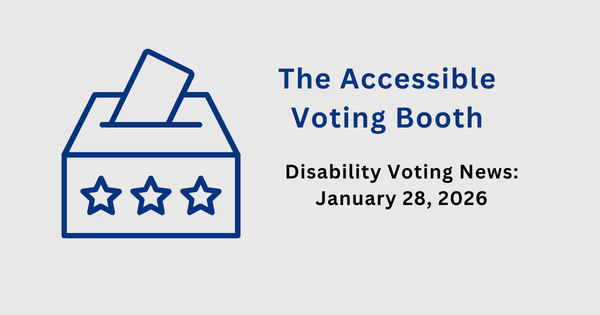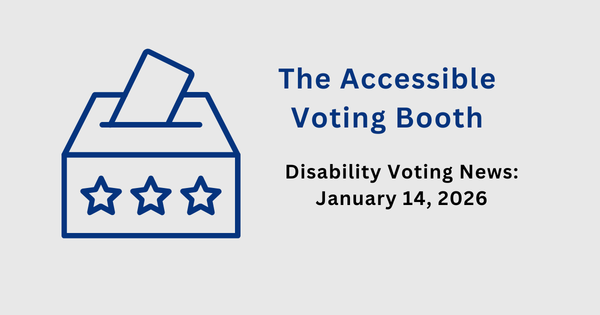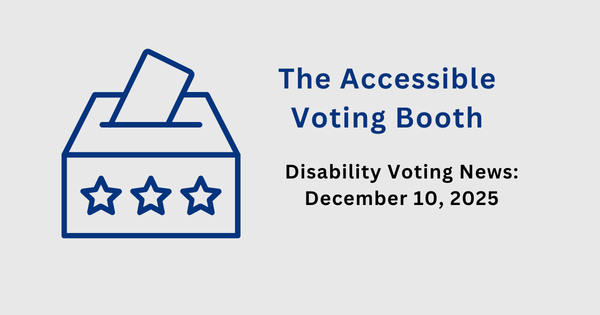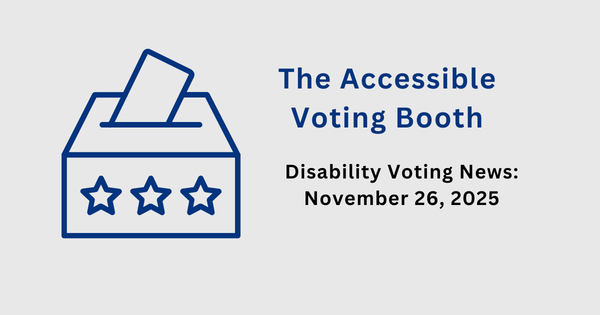Disability Voting News: June 11, 2025
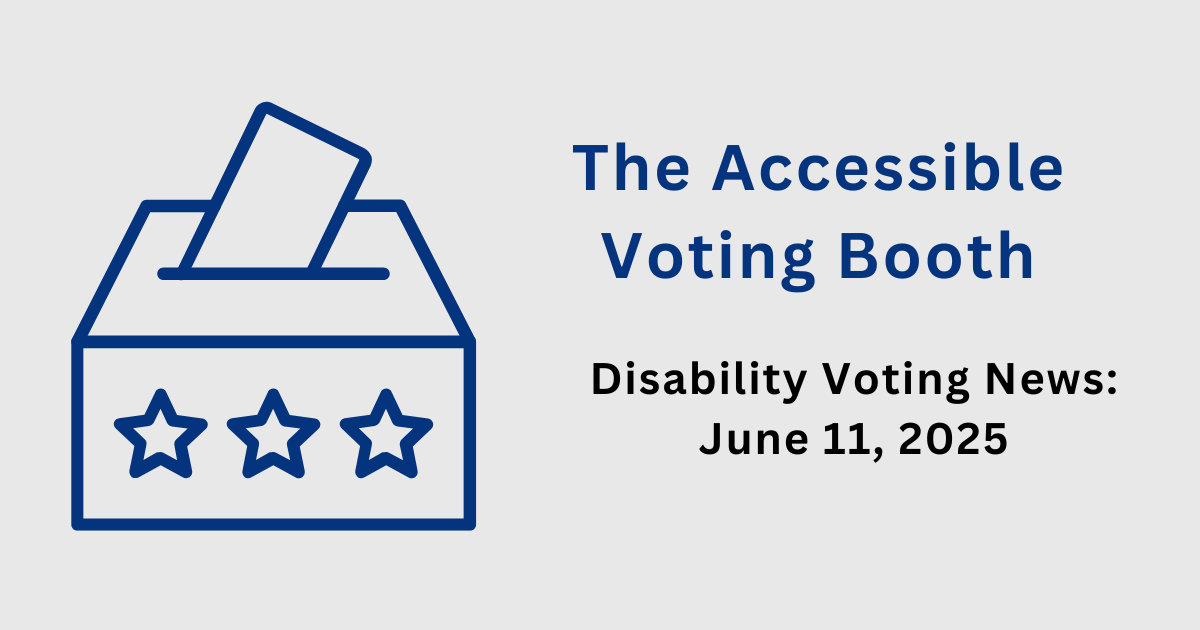
Welcome to the Accessible Voting Booth for June 11, 2025. It’s time to catch up on some state-level voting rights news! It’s been a few weeks since I’ve been able to do state voting legislation updates, and there’s far more going on than I can cover here so as always, I encourage you to read Voting Rights Lab’s The Markup, which provides weekly updates and analysis on voting rights legislation and court cases around the country.
This week’s updates include the failure of Texas’s documentary proof of citizenship legislation and advancement of a bill to expand early voting, mail ballot signature verification in Nebraska, Colorado’s new Voting Rights Act, and an expansive piece of legislation in Pennsylvania to reform early and mail voting.
Texas fails to advance proof of citizenship bill (via Voting Rights Lab).
Starting off with some great news: the Texas legislature has failed to advance SB16! As I reported in the March 19th issue of The Accessible Voting Booth:
“Texas S 16 would create a documentary proof of citizenship (DPOC) requirement when registering to vote, and establishes a list of accepted documents, such as a U.S. passport, birth certificate, citizenship papers, identification issued by the agency of the U.S. responsible for citizenship and immigration, or a certificate of report of birth or consular report of birth abroad issued by the State Department.”
If voters didn’t provide DPOC, they would only be allowed to vote in U.S. House and Senate races, and not for President, state office, local office, or ballot measures. This bill had unanimous support from Senate Republicans. Voting Rights Lab reported it as one of the “most extreme” versions of documentary proof of citizenship legislation moving through state legislatures in 2025.
Texas legislature passes legislation to expand early voting. (via Voting Rights Lab).
That’s right, there’s not one but TWO pieces of good news out of Texas this week. The Texas legislature passed SB 2753, which would eliminate a four-day gap between the end of early voting and Election Day. If signed into law, this bill would create a continuous early voting period beginning the 12th day before the election and continuing until the day before the election.
As I’ve mentioned many times in the past, expanded early voting is great for voters with disabilities because it reduces lines on Election Day and expands the available dates that they may go to the polling place to vote. This is particularly important because Texas restricts absentee voting to people with disabilities, people who are 65 years or older, and voters who are away from home on Election Day. Even though voters with disabilities are permitted to use absentee voting, many may not feel like they are qualified (or “disabled enough”) to use this option. Additionally, Texas does not offer remote ballot delivery for people who are blind, low vision, or have a mobility disability and who need to read and mark their ballot electronically. These voters must travel to the polling place if they want to use an accessible voting machine to mark their ballot independently, so expanded early voting means they would have more time to be able to go vote in person and use accessible voting equipment.
This legislation has now been sent to the governor’s desk for signature.
Nebraska implements mail ballot signature verification (via Voting Rights Lab).
Nebraska Governor Jim Pillen signed LB521 into law. This legislation requires election officials to verify the signature on mail ballot envelopes against the signature they have on file, such as the signature on the voter’s registration form. This legislation is bad news for disabled voters as signature matching can prove challenging for people with mobility disabilities. It can be a particularly difficult challenge for someone with a progressive disability that has changed their mobility and ability to write a signature over time. Additionally, Nebraska does not have a ballot curing process by which election officials would be required to notify voters about issues with their mail-in ballot and allow them to fix those issues so their ballots can be counted.
Colorado enacts Voting Rights Act. (via Legal Defense Fund).
In the April 9th issue of the Accessible Voting Booth, I discussed the Colorado Senate’s passage of S1, the Colorado Voting Rights Act. This legislation takes broad action to protect voters who experience discrimination and includes several provisions that protect the rights of voters with disabilities. Now, this legislation has been signed into law in Colorado, making it the ninth state to have enacted a state Voting Rights Act that builds upon the federal Voting Rights Act of 1965. As I stated in my coverage of S1, this bill is broadly beneficial for disabled voters:
“Additionally, this bill includes provisions that expand disability and language access. Facilities serving people with disabilities would be required to publish voter information notices 30 days before statewide general and primary elections that includes information on voting rights, accessibility, and drop box locations. As I mentioned above, it can sometimes be challenging to find information on voting accessibility, such as information on who can assist voters, how to register to vote by mail, and how to request an electronic absentee ballot. This requirement would make that information more readily available. Furthermore, this bill would require municipalities with over 3,000 residents to create and publish sample ballots in minority languages, provide in-person locations for voting a ballot in a minority language, and notify voters of language access options.”
This legislation was enacted on May 12, 2025. Congratulations, Colorado!
Pennsylvania House passes early and mail voting reform bill (via Voting Rights Lab).
In May, the Pennsylvania House passed HB1396, a bill that would make comprehensive changes to the state’s early and mail voting processes to expand voter access. Many of the provisions in this bill will benefit voters with disabilities. Let’s take a look at some of them:
Creation of a uniform statewide period of in-person early voting. Currently, Pennsylvania offers an “in-person absentee voting period” where voters can go to their local election office and cast their absentee ballot in person. Each election office is responsible for determining how long in-person absentee voting is available, and it is generally only available during business hours on weekdays.
HB1396 would establish an in-person early voting period that would last from the 11th day before Election Day to the Sunday before Election Day. Each county would be required to establish at least one early voting location that would be open between 8 to 12 hours a day, and the legislation would explicitly require election officials to select locations that are accessible to voters with disabilities, as well as to consider proximity to public transit, parking availability, population density, and other factors to ensure that the most beneficial locations are chosen to serve voters in the county. The polling places would be required to have accessible voting equipment and voting booths.
Creation of a mail-in ballot notice and cure process. Pennsylvania does not have a uniform notice and cure process for ballots that are missing voters’ signatures, and it is currently left to counties to decide whether they provide a notice and cure process. This legislation would establish a unified standard across the state for providing notice and a cure period for voters to fix their missing signatures, including:
- Notifying voters within 24 hours by electronic communication, phone, and/or letter.
- Requiring counties to publish a list of voters whose ballots require cure.
- Requiring election officials to develop a cure form that can be completed on paper, electronically, or by telephone and establish the requirements for what documentation is required to cure a ballot.
- Establishing a cure deadline for the sixth day after an election.
Creation of a permanent mail voter list. Currently, voters must reapply each year to receive a mail-in ballot, and Pennsylvania election officials maintain a list of voters who can receive a ballot application automatically at the beginning of each year. Under this legislation, voters who sign up to receive a mail ballot would be able to receive the ballot automatically for all future elections (unless they opt out or become ineligible to vote). This is a very convenient option because it lowers the chances that voters will forget to re-register to receive a mail ballot. Virginia has a permanent mail voter list that works the same way–I haven’t had to register to receive a ballot in years and continue to receive my ballot in the mail.
Elimination of the date requirement for mail ballot declarations and reduces grounds for rejecting mail ballots. Ballots would no longer be rejected if voters forget to write the date on the ballot envelope. Additionally, election officials would no longer reject ballots that include certain extra markings or suffered damage.
Requires counties to provide ballot drop boxes. Pennsylvania law currently doesn’t address drop boxes and it has been left up to counties to decide whether to use them. This legislation would establish requirements on the number of drop boxes counties must offer and how long they must be available, and it would expressly prohibit counties from prohibiting drop boxes.
Establishes paid postage return for mail ballots and requires ballot tracking. This would reduce another administrative burden for voters who vote by mail ballot, as they won’t be required to pay for their own postage. Pennsylvania currently offers ballot tracking, but it is not required in Pennsylvania law, so this law would ensure that ballot tracking is offered in the future.
Additionally, this legislation would eliminate the process that allows voters, election officers, and poll workers to challenge a voter’s identity or residency. It also addresses other procedures around voter ID, provisional ballots, electronic poll books, ballot processing, and voter list maintenance. HB 1396 has moved to the Senate for consideration, and it has been sent to the Senate Committee on State Government.
Thank you for reading this week’s edition of The Accessible Voting Booth! As always, if you’d like to support the newsletter and my work, here’s how:
- Subscribe to the Accessible Voting Booth newsletter.
- Share this newsletter with your network to spread the word about disability voting rights.
- Leave me a tip. Thank you for supporting my work!

